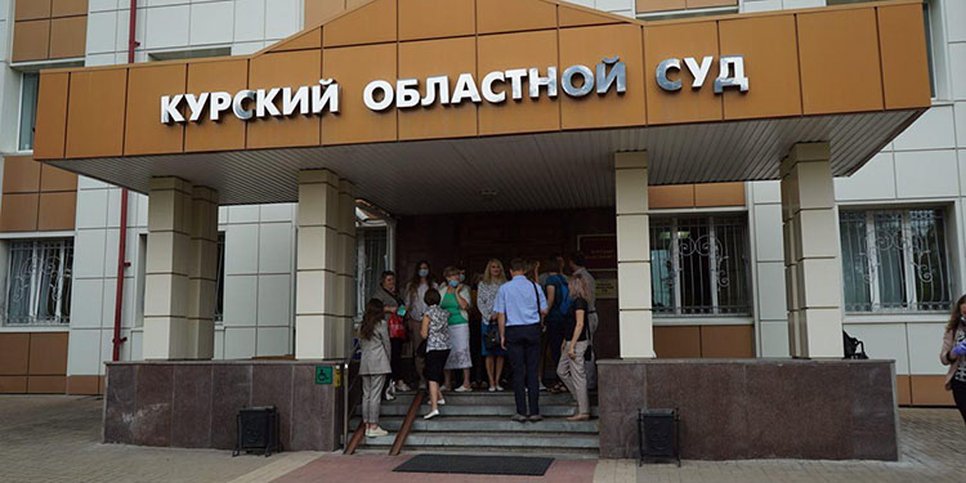Pictured: Dennis Christensen’s support group outside the courthouse. 4 September 2020
Pictured: Dennis Christensen’s support group outside the courthouse. 4 September 2020
A court decision leaves Dennis Christensen behind bars, but is providing an opportunity to another court to free the believer
Oryol RegionOn September 4, 2020, Vladimir Olovnikov, judge of the Kursk Regional Court, overturned the court's decision to release Dennis Christensen and sent the case of one of Jehovah's Witnesses from Denmark for a new trial to the Lgov District Court of the Kursk Region.
As lawyer Anton Bogdanov said after the court hearing, "Dennis was not at all discouraged and met this court decision with a smile." "His health condition is consistently difficult, as there is no adequate treatment for his neurological diseases. Despite this, the believer is determined to go to the end, defending his innocence," the lawyer said.
"There is not a single person, either at large or in prison, who has been harmed in any way by Christensen. But he, as some kind of murderer or rapist, has been purposefully kept behind bars for the 4th year only because he prayed to Jehovah together with others and talked about love for one's neighbor. This only underlines the demonstratively repressive nature of the persecution of Jehovah's Witnesses in Russia," Yaroslav Sivulsky, a representative of the European Association of Jehovah's Witnesses, commented on the decision of the Kursk service.
Dane Dennis Christensen is the first Jehovah's Witness imprisoned for his faith even before the entry into force of the decision of the Supreme Court of the Russian Federation to ban religious organizations of Jehovah's Witnesses in Russia. Christensen was arrested on May 25, 2017 in Oryol, where he had lived with his wife Irina for more than a decade. In February 2019, the Zheleznodorozhny District Court of Oryol sentenced the believer to 6 years in a general regime colony. The court considered it extremism that Dennis gathered with fellow believers for worship. At the same time, there were no victims of Christensen's actions.
To date, the Dane has actually been behind bars for about 1200 days (a little more than 3 years and 3 months), of which 731 days were in a pre-trial detention center. Taking into account the fact that according to the law, one day in a pre-trial detention center equals 1.5 days in a general regime colony, Christensen served more than 4 years of the 6-year term appointed by the court.
Already a year ago, he was eligible for parole or other mitigation. On the 4th attempt, the believer's petition went to court, and on June 23, 2020, the judge of the Lgovsky District Court of the Kursk Region, Galina Petlitsa, decided to replace Christensen's unserved part of the sentence with a fine. However, the Kursk prosecutor for the supervision of correctional institutions, Alexei Shatunov, appealed this decision. Not only did Dennis not receive legal freedom, but he also faced additional pressure from the colony authorities.
Even before the decision to release Lgov Colony No. 3, the administration of Lgov Colony No. 3 used far-fetched pretexts to draw up a negative characterization of Christensen. In particular, he was regularly forced to perform types of work that were contraindicated for health reasons (in the colony, Dennis suffered pneumonia, he was diagnosed with serious diseases of the spine). After the court's decision to replace the term with a fine, the management of the correctional institution fabricated violations against the believer, as a result of which he spent 27 days in a punishment cell.
The unfair treatment of Christensen by the authorities caused a wide international outcry. "The accusation and imprisonment of Christensen only for confessing his faith is an unacceptable violation of the right to freedom of religion," said observers of the Parliamentary Assembly of the Council of Europe (PACE). The Office of the UN High Commissioner for Human Rights, the Kingdom of Denmark, the European Union External Action Service , the US Commission on International Religious Freedom, the Human Rights Council of the Russian Federation and other well-known human rights organizations and ombudsmen also spoke in support of the first Russian prisoner of conscience.

